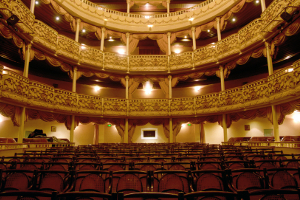Classical Genres
2 hours a week for 8 weeks

Ever wondered what a symphony actually is? Can’t tell a suite from a sonata? This course is designed for classical music beginners who want to know how to better appreciate the music they listen to. Several common types of classical music will be explored, including symphony, concerto, sonata, suite, opera and oratorio. Each week will begin with a simple explanation, move into a deeper exploration of examples by great composers, and finish with guided listening through a full example. No musical knowledge is necessary.
Course Outline
The Sonata
- What is a sonata?
- What are ‘movements’ in classical music, and why have them?
- How the sonata has developed over time
- What is sonata form?
- Interlude: A brief history of western music
- Beethoven: Moonlight Sonata
- Chopin: Sonata for Cello and Piano
- Beethoven: Piano Sonata No. 8 'Pathetique'
The Suite
- What is a suite?
- Different types of suites
- The Baroque suite
- The ballet suite
- Interlude: The symphony orchestra
- Tchaikovsky: The Nutcracker Suite
- Debussy: Suite Bergamasque
- Bach: Cello Suite in G Major BWV 1007
The Concerto Grosso
- What is a Concerto Grosso?
- Different types of concerto
- Ritornello form: contrast of large and small
- Interlude: The concept of key
- Vivaldi’s Four Seasons
- Bach’s Brandenburg Concertos
- Handel’s Concerto Grosso 'Alexander’s Feast’
Opera
- What makes an opera, and what makes a musical?
- The types of opera
- The elements of opera: how stories are told in song
- The operatic voice
- A word on Wagner
- Verdi: Rigoletto
- Wagner: The Flying Dutchman
- Puccini: Madama Butterfly
- Rossini: The Barber of Seville
The Symphony
- What is a symphony?
- A musical feast in four courses
- The development of the symphony
- The symphonies of Haydn, Mozart and Beethoven
- The Symphonic Poem
- Gershwin: An American in Paris
- Mozart: Symphony No. 28
- Beethoven: Symphony No. 5
- Mahler: Symphony No. 5 Adagietto
The Mass and the Requiem
- The structure of the Mass
- The Mass as a musical genre
- The structure of the Requiem
- How the structure and context affects the music
- Palestrina: Missa Papae Marcelli
- Bach: Mass in B Minor
- Beethoven: Missa Solemnis
- Mozart: Requiem
- Faure: Requiem
- Verdi: Requiem
The Concerto
- Different types of concerto
- What is a cadenza?
- How the concerto changed in the Classical period
- The Sinfonia Concertante
- Mozart: Clarinet Concerto
- Beethoven: Violin Concerto and the ‘Emperor’ Piano Concerto
- Some great concertos: Tchaikovsky, Grieg, Liszt, Rakhmaninov
- Haydn: Trumpet Concerto in E Flat Major
- Mozart: Horn Concerto No. 3
The Oratorio
- What is an oratorio?
- The development of the oratorio
- Other choral forms: the Cantata; Passion settings
- Elgar: The Dream of Gerontius
- Handel: Messiah
- Haydn: The Creation
- Bach: St Matthew Passion
- Walton: Belshazzar’s Feast

Buy the course notes for this class
In hard copy book form, through Lulu Press$26 + postage
(This course was previously called “Classical Sampler.”)
About Susan Deas
Susan Deas is a professional musician, lecturer and teacher. She has been teaching music appreciation courses for more than twenty years, through Sydney University’s Centre for Continuing Education, WEA Sydney and at other venues. Her training includes a Bachelor of Music with a major in Performance (Piano) and Musicology, a Master of Music Studies (Studio Pedagogy), a Bachelor of Arts (Communications), and an A.Mus.A in Musicianship. Susan teaches piano and music theory to adults and children, and plays piano and organ at various venues around Sydney. Susan is an Accredited Member of the Music Teachers’ Association of NSW.
More about Susan’s qualifications

